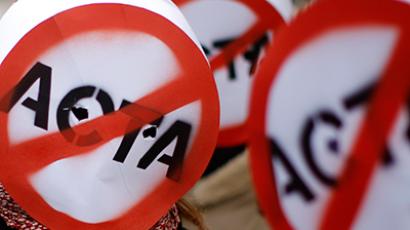Paving way for ACTA? Canada considers anti-counterfeit bill encouraged by US

Canada has introduced a bill strongly resembling the Anti-Counterfeit Trade Agreement (ACTA), prompting speculation that authorities were prepared to ratify the notorious legislation. The US encouraged Canada to adopt the bill.
According to Ottawa, Bill C-56 or Combating Counterfeit Products
Act, is aimed at countering harmful counterfeiting activities, much
like the international ACTA treaty.
If passed, the document would mainly concern copyright issues;
border guards would be forced to serve as copyright experts without
court oversight, and new criminal penalties would be introduced for
counterfeiting commercial trademarks.
Under the law, imports of any works copyrighted in Canada but made
outside the country would be suspended by the Canada Border
Services Agency, if the copyright owner in Canada submits a written
request.
The bill has raised fears that Canada may be preparing to ratify ACTA. Washington has recently encouraged Ottawa to comply with the notorious agreement.
In the recently published 2013 Trade Policy Agenda and 2012
Trade Policy Report, the Office of the United States Trade
Representative has encouraged Canada to “meet its
Anti-Counterfeit Trade Agreement (ACTA) obligations by providing
its customs officials with ex officio authority to stop the transit
of counterfeit and pirated products through its territory.”
ACTA was intended to become a global treaty; it has been signed by
31 nations, including the US, Canada, Japan, Mexico, South Korea
and 22 EU member-states. However, to come into force, it must be
signed by at least 6 countries.
ACTA aims to protect copyrights in many industries, from software
engineering to agriculture. Critics have said that governments
would have to make draconian invasions of online privacy to
implement provisions of the treaty.
The EU has already blocked the document, but it was ratified by
Japan; the other signatories have yet to decide.
Critics of ACTA have argued the treaty seeks to protect copyright
at the expense of freedom of speech. Numerous mass protests were
staged in the US and Europe against the controversial
agreement.














